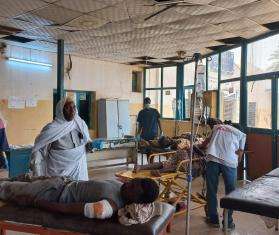NEW YORK/JERUSALEM, October 8, 2024 — Israeli evacuation orders issued yesterday for parts of northern Gaza are pushing tens of thousands of Palestinians to immediately flee south as the area is targeted by airstrikes and a ground offensive.
These forced mass evacuations of homes and the bombing of neighborhoods by Israeli forces are turning the north of Gaza into an unlivable wasteland, said Doctors Without Borders/Médecins Sans Frontières (MSF). Israeli forces must urgently halt evacuation orders, ensure the protection of civilians, and allow desperately needed humanitarian supplies to enter the north.
In this latest forced mass displacement, residents of the northern cities of Beit Hanoun, Jabalia, and Beit Lahia have been urged to move to the overcrowded, so-called humanitarian zone further south between Al-Mawasi and Deir al-Balah, where 1 million people are already living in inhumane conditions. This zone remains unsafe for civilians and aid workers as Israeli forces continue to repeatedly strike the area. To make matters worse, no humanitarian supplies have been allowed to enter the north since October 1.

Options for medical care are shrinking by the day
Among those facing evacuation orders in the north are seven MSF staff who managed to find shelter in Gaza City. Five others remain blocked in Jabalia, where Israeli forces are on the ground carrying out attacks.
“All of a sudden, I was told that we had to move from the north,” said Mahmoud, an MSF watchman, who was sheltering at the MSF guest house in Gaza City after leaving Jabalia at night. “We left our home in despair, under bombs, missiles, and artillery. It was very, very difficult. I would prefer to die than to be displaced to the south; my home is here, and I do not want to leave.”
Israeli forces also called for the evacuation of the three main hospitals in northern Gaza: Indonesian, Kamal Adwan, and Al-Awda hospitals. These are operating at minimal capacity and have a total of 317 patients still hospitalized, with around 80 people in intensive care and unable to move, according to the Ministry of Health. These three medical facilities, as well as others across the Strip, must be protected at all costs. Each time a medical facility is evacuated or attacked, people lose access to lifesaving medical care.
The MSF clinic in Gaza City received 255 patients on Sunday and Monday alone, as options for people to access medical care shrink by the day. For some people, accessing the few existing health facilities is impossible; MSF teams have received reports of wounded people who have died as they were unable to seek medical care.
A worsening humanitarian situation in the so-called humanitarian zone
"The latest move to forcefully and violently push thousands of people from northern Gaza to the south is turning the north into a lifeless desert—while aggravating the situation in the south—where more than 1 million people have already been squeezed into a small portion of the Gaza Strip and live in deplorable conditions,” said Sarah Vuylsteke, MSF project coordinator in Gaza. “Access to water, health care, and safety is already almost nonexistent, and the thought of more people fitting into the [so-called humanitarian zone] is impossible to imagine. People have been subjected to endless displacement and relentless bombing for the past 12 months. Enough is enough, this must stop now.”
While the Israeli authorities have recently declared a minimal expansion of the so-called humanitarian zone in the south, the area remains subject to evacuation orders and is unsafe due to regular Israeli bombardment. Many people living in the zone are suffering from skin diseases and respiratory infections because of crowded and unhygienic conditions. The situation is even more worrying with the approach of winter, during which people will be exposed to cold temperatures.
The relentless killing of Palestinians in Gaza must stop now, and an immediate and sustained ceasefire must be implemented.




